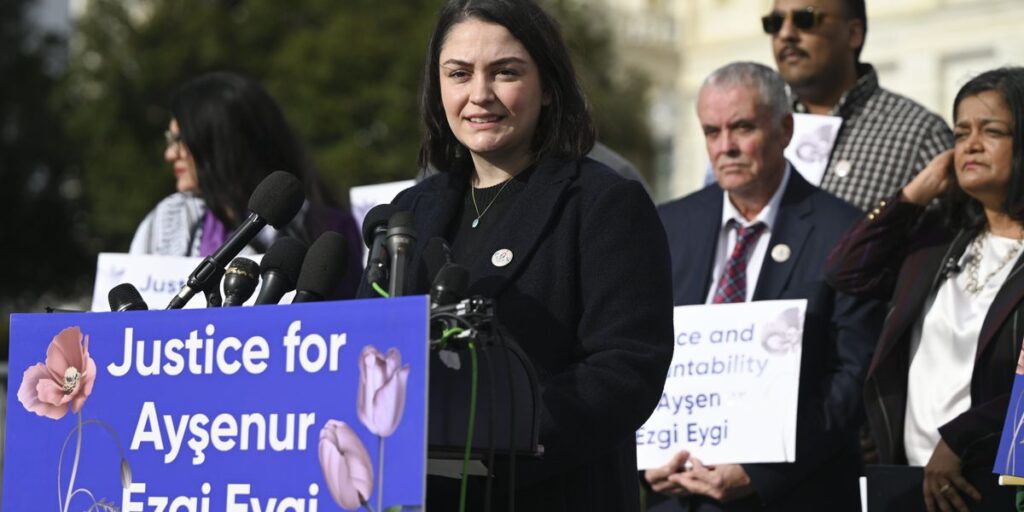The family of Ayşenur Ezgi Eygi, a 26-year-old Turkish American activist killed by the Israeli military in the occupied West Bank, is intensifying its call for an independent, U.S.-led investigation into her death. Eygi was fatally shot on September 6, while she was volunteering as an international observer during a peaceful protest against Israel’s illegal settlement expansion. During a press conference at the U.S. Capitol, Eygi’s family, together with support from progressive lawmakers and advocates, urged the Biden administration to fulfill its promise of accountability for American citizens harmed abroad. Representative Delia Ramirez referenced President Biden’s previous assertion that the U.S. would respond if an American citizen was injured, emphasizing the need for an independent inquiry and accountability for the deaths of American citizens in similar situations.
In the aftermath of Eygi’s killing, both the White House and the State Department expressed frustration with the Israeli government. However, Eygi’s family reported that they have yet to receive a personal call from President Biden. The Israeli military conducted a preliminary investigation into Eygi’s death, concluding it was likely a soldier shot her “indirectly and unintentionally” during a riot. Contrarily, evidence and eyewitness accounts suggest Eygi was deliberately shot in the head by an Israeli sniper after the protest had ended while she was in an olive grove located over 200 yards from Israeli forces. Eygi’s husband, Hamid Ali, expressed disbelief at the official narrative and criticized the U.S. government’s acceptance of the Israeli military’s claims without demanding accountability.
Eygi’s family met with Secretary of State Antony Blinken to discuss their desire for a U.S. investigation. The meeting reportedly left them pessimistic, as Blinken reiterated vague assurances, mirroring the responses given in other similar cases involving American casualties at the hands of Israeli forces. This included previous incidents involving activist Rachel Corrie and journalist Shireen Abu Akleh, whose cases have seen similar indifference from the U.S. administration. After the meeting, family members expressed their disappointment regarding the lack of urgency displayed by the State Department in addressing Eygi’s case.
According to the family, the State Department maintains that action will not be taken until Israel completes its own internal investigation—an action historically perceived to yield little accountability. A spokesperson for the State Department emphasized the seriousness with which they regard Eygi’s case; however, this was met with skepticism from Eygi’s family and various lawmakers. Representative Pramila Jayapal criticized the State Department’s lack of commitment and perceived inadequacy in addressing the matter, echoing similar sentiments from over 100 Congress members advocating for an independent inquiry into Eygi’s killing.
As tensions continue to rise in the West Bank, where violent military operations and settler aggressions have surged, Eygi’s family and supporters are focusing on their calls for justice within the context of increasing U.S. military support for Israel. Eygi was an outspoken advocate for Palestinian rights and believed in the moral obligation to bear witness to injustices. This conviction resonates within her family’s message, which seeks not only justice for Eygi but also to honor her legacy by advocating for the rights and lives of others impacted by similar violence.
Progressives like Representative Rashida Tlaib highlighted Eygi’s commitment to humanitarian principles, stating that her demand for justice serves a broader purpose of saving lives across all communities. This sentiment was underscored during a vigil organized in Eygi’s memory, where participants were reminded of the harsh realities facing Palestinians amidst increasing violence. Advocates are now mobilizing to maintain pressure on the U.S. government for accountability, illustrating the intersection of domestic policy and international human rights issues in the context of the Israeli-Palestinian conflict.

